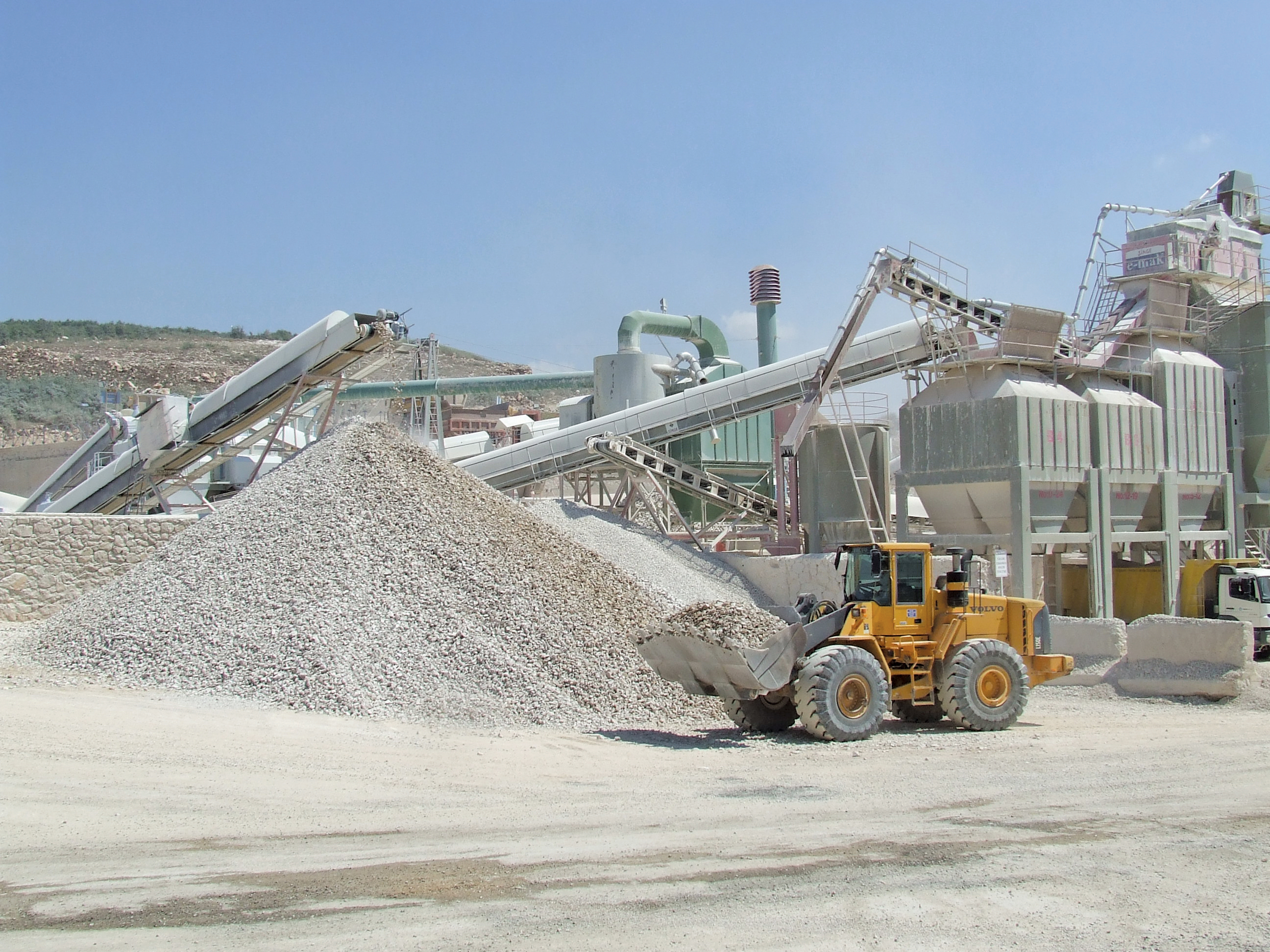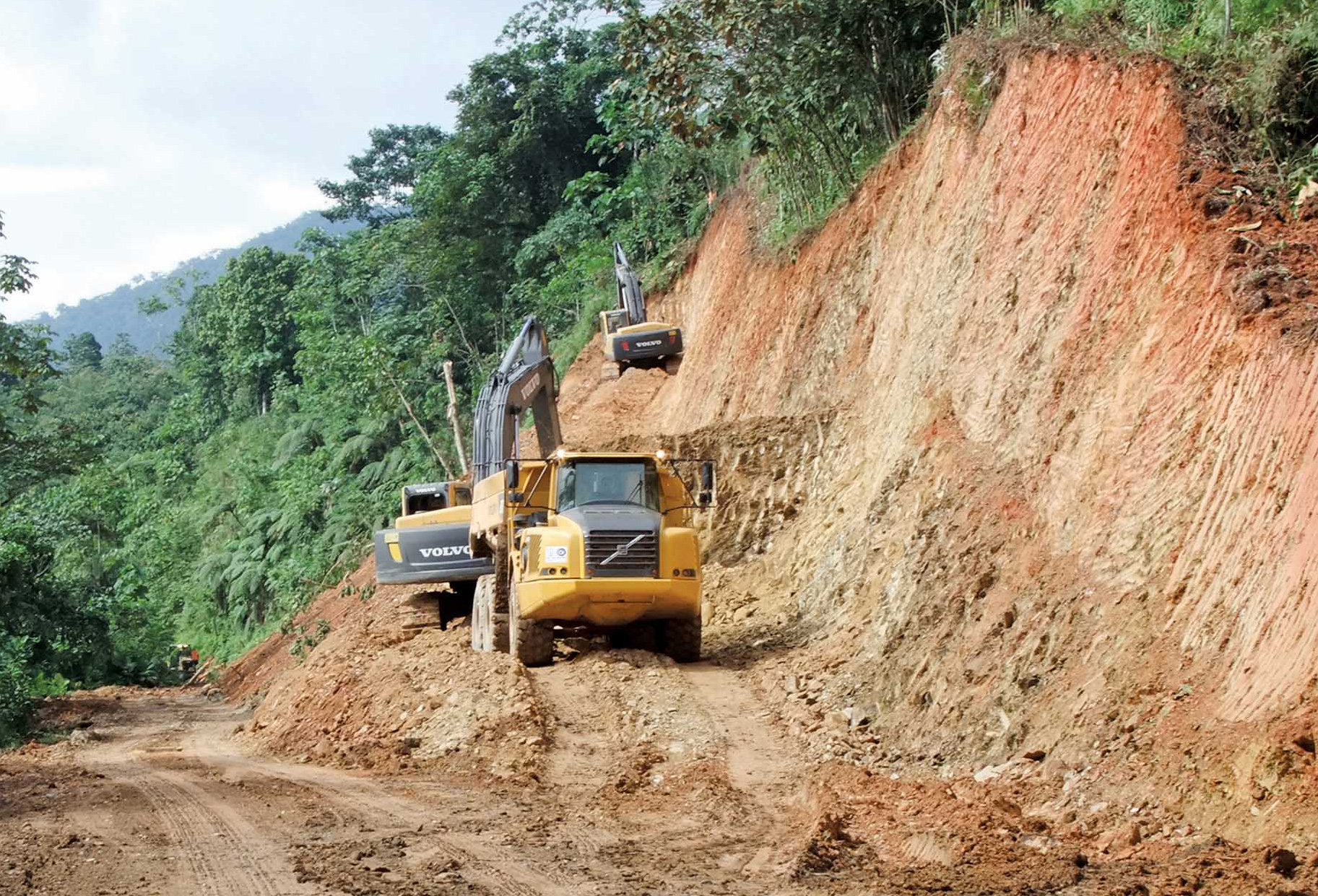The Turkish Government has an extensive road-building programe - GÜLAY MALOKÇ provides an overview of the country's asphalt industry. Turkey covers an area approaching 800,000km2, of which about 97% is in Asia and 3% in Europe, while its population is close to 72 million. The country borders with Greece and Bulgaria on its European side, and Syria, Iraq, Iran, Armenia and Georgia on the Asian side. Commanding an important strategic position, Turkey controls the routes from the Black Sea to the Mediterranean

About 100 million tonnes of aggregate/year is produced in quarries for use in Turkey’s road construction sector
The Turkish Government has an extensive road-building programe - GÜLAY MALOKÇ provides an overview of the country's asphalt industry
Turkey covers an area approaching 800,000km2, of which about 97% is in Asia and 3% in Europe, while its population is close to 72 million. The country borders with Greece and Bulgaria on its European side, and Syria, Iraq, Iran, Armenia and Georgia on the Asian side. Commanding an important strategic position, Turkey controls the routes from the Black Sea to the Mediterranean Sea via the Bosporus Strait, the Marmara Sea and the Strait of Dardanelles. This geographical location, at the crossroads of three continents - Europe, Asia and Africa - contributes a great deal to the global competitiveness of Turkish construction products and services abroad.Due to its geographic location, Turkey’s construction sector has grown rapidly by not only exploiting opportunities from the development of its local economy, but by successfully penetrating opportunities in the Middle East, Central Asia and Russia.
Over the past seven years, Turkey has become a key emerging market in Europe and this growth is expected to continue as the country is predicted to become the ninth largest economy in the world by 2050 (according to data from
Roads in Turkey are the main form of domestic transport and these can be split into categories such as motorways, state roads (highways) and provincial roads. This last category includes rural, urban and village roads while the total length of the road network in Turkey is approximately 65,382km.
State roads provide the links between regional and provincial centres and provide connections to key airports and seaports. These are under the responsibility of the General Directorate of Highways connected to the Ministry of Transport and Communications. The provincial roads are the secondary roads within the borders of the provinces. These connect the various towns and cities together and are the responsibility of the respective provinces.
Highways play a major role for Turkey’s passenger and freight transportation by carrying almost 95% of passenger and 92% of freight traffic. On average 50% of the motor vehicles travelling on Turkish highways are trucks. So to meet demand the Turkish Government has been upgrading existing single carriageway to dual carriageways, as well as constructing new highways and bridges.
| Road Class | Hot-Mix asphalt (HMA) | Surface dressing | Stone block | Stabilised | Earth | Primitive | Total Length |
|---|---|---|---|---|---|---|---|
| Motorways | 2,127 | - | - | - | - | - | 2,127 |
| State highways | 11,240 | 19,631 | 73 | 112 | 29 | 290 | 31,375 |
| Provincial road | 1,910 | 26,831 | 183 | 957 | 637 | 1,362 | 31,880 |
| Total | 15,277 | 46,642 | 256 | 1,069 | 666 | 1,652 | 65,382 |
| Capacity t/h | Municipalities | General Directorate of Highways | Other Administrations | Companies | Total |
|---|---|---|---|---|---|
| >100 | 39 | 10 | 14 | 465 | 528 |
| 50-100 | 60 | 2 | 34 | 19 | 115 |
| <50 | 35 | 109 | 21 | - | 165 |
| Total | 134 | 121 | 69 | 484 | 808 |
According to a decision by the Turkish Ministry of Transport and Communications, work to extend the total distance of dual carriageways has been successful since the programme commenced in 2003. When this programme started Turkey had just 6,100km of dual carriageways compared to 22,000km at present, highlighting the extensive investment the country has made to increase its road network in less than 10 years. This growth will continue and in the next 10 years, the Turkish Ministry of Transport and Communications aims to extend the country’s dual carriageway network to a total of some 36,500km.
The Turkish Ministry of Transport and Communications is using BOT model to develop this network of new motorways and bridges. The ministry has established a series of deadlines and its first and second priority projects, 28 in all, will add a total of 9,680km of motorways and bridges to the network. The first priority projects will be completed by 2023 while the second priority should be ready by 2035.
This new road construction programme is placing heavy demand on aggregate producers and bitumen suppliers and the Turkish Asphalt Industry has extensive data on the market.
In parallel to the growing asphalt road industry, the number of contractors and suppliers is also increasing in Turkey. The demand for new asphalt equipment is increasing rapidly and there are now around 300 companies dealing with hot mix asphalt production and paving, with a further 80 dealing with paving only.
Almost all of the HMA works being undertaken by the General Directorate of Highways are being carried out by the asphalt contractors. There is a difference with regard to the construction of urban links however and in the municipalities for metropolitan cities, almost all of the HMA works are contracted out whereas in smaller towns and cities the works are implemented by local authorities using their own facilities. ISFALT (Istanbul Asfalt Fabrikalari Sanayi ve Ticaret) is the biggest asphalt producer and paving firm in Istanbul and its operations are providing for the needs of Istanbul Metropolitan Municipality and county municipalities.
Turkey’s geographic location does mean that it has a wide array of climatic conditions. Since 2000 there has been widespread use of polymer modified bitumen (PMB), instead of conventional bitumen in the production of HMA for wearing courses. This change has been made with the aim of ensuring more durability and providing better resistance to rutting for roads carrying heavy traffic volumes, especially in hot climate regions. In addition to the use of PMB in the production of HMA, highway authorities have decided to apply stone mastic asphalt (SMA) for the construction of wearing course surfaces, especially for motorway rehabilitation projects and roads with heavy traffic loads. This move has been made to deliver greater durability and also to increase anti-skidding properties for the surfaces.
| Year | Hot-mix asphalt million ton | Surface dressing km3 | Cold- mix asphalt x 1,000 ton | |
|---|---|---|---|---|
| Motorways' Highways | 2007 | 4.9 | 164 | 470 |
| 2008 | 10.2 | 175 | 2,904 | |
| 2009 | 14.9 | 180 | 962 | |
| 2010 | 22.1 | 200 | 1,643 | |
| 2011 | 29.4 | 172.2 | 512 | |
| | | |||
| Urban Roads | 2007 | 16.9 | 18 | 84 |
| 2008 | 16.3 | 21 | 297 | |
| 2009 | 7.9 | 9 | 26 | |
| 2010 | 13.0 | 11 | 210 | |
| 2011 | 13.6 | 5,6 | 22 | |
| | | |||
| Rural Roads | 2007 | 0.31 | 158 | 746 |
| 2008 | 0.07 | 71 | 344 | |
| 2009 | 0.28 | 40 | 415 | |
| 2010 | 0.20 | 86 | 515 | |
| 2011 | 0.46 | 99.4 | 486 | |
| | | |||
| Total | 2007 | 22.21 | 340 | 1,300 |
| 2008 | 26.6 | 267 | 3,545 | |
| 2009 | 23.1 | 229 | 1,403 | |
| 2010 | 35.3 | 297 | 2,368 | |
| 2011 | 43.5 | 277.2 | 1,020 |
The Turkish road construction uses a variety of materials including paving grade bitumen, PMB, cut-back asphalt and bituminous emulsions. Nearly of the paving grade bitumen used in Turkey is produced at the four refineries that belong to TÜPRA (Turkish Petroleum Refineries). Generally bitumen is not imported as the demand for materials is met by the production of TÜPRA.
However, PMBs are generally produced by contractors in their own PMB plants. For this sector, about 100,000tonnes of material is used in producing bitumen emulsion and this is employed mainly as tack coat, prime coat and for surface dressing and slurry seal. Additives are also used for the production of HMA in Turkey along with an array of anti-stripping agents, as well as cationic emulsifiers and a number of cold-mix agents.
In road construction, calcareous aggregates are generally used for unbound base courses, surface dressings and asphalt concrete layers. There has been a tendency towards using harder aggregates in wearing courses with the use of basalt or granite, as these have a greater wear life and maintain anti-skid properties over time. In all, the country uses some 100 million tonnes of aggregate for its road construction programme/year.
| Year | Consumption x1,000 ton |
|---|---|
| 2005 | 1,453 |
| 2006 | 1,555 |
| 2007 | 1,876 |
| 2008 | 2,014 |
| 2009 | 1,791 |
| 2010 | 2,370 |
| 2011 | 2,590 |
While Turkey is not a member country of the European Union (EU), but in line with the Custom Union Agreement, the European standards (EN) are generally applied in the country. So, the EN standards are also adapted for asphalt mixes, bituminous binders and aggregates by the Turkish Standards Institution (TSE). Also in Turkey there are several Notified Bodies available that are able to give CE marking where needed.
In addition, the General Directorate of Highways Technical Research Department is able to test the materials such as bituminous binders and asphalt mixes with its well-established laboratory testing equipment, which includes first and second generation testing machines.
There are several major players in Turkey’s asphalt industry and these include the Ministry of Transport, the General Directorate of Highways (KGM), Isfalt, Istanbul Metropolitan Municipality Municipalities, the Turkish Asphalt Contractors Association (ASMUD) and the Turkish Petroleum Refineries Corporation (TÜPRA). They also include the Turkish Contractors Association (TCA), the Turkish Employers’ Association of Construction Industries (INTES), the Turkish Standards Institution (TSE), the Ministry of Environment and the Turkish Road Association (YTMK). However, despite a strong market for road construction given the Turkish Government’s focus on expanding the network, the country’s asphalt sector does face major challenges. These include low tender prices, high prices for materials and equipment used in asphalt production, high crude oil prices, heavy traffic loads with a high percentage of heavy vehicles and challenging climatic conditions. In addition, the Turkish market is also keen to implement the use of road recycling and warm mix asphalt in a bid to lower the environmental impact of road construction while also offering quality surfaces. Clearly Turkey’s road construction sector faces major challenges and complexities and while demand is strong due to the road expansion programme, the market is highly competitive.










